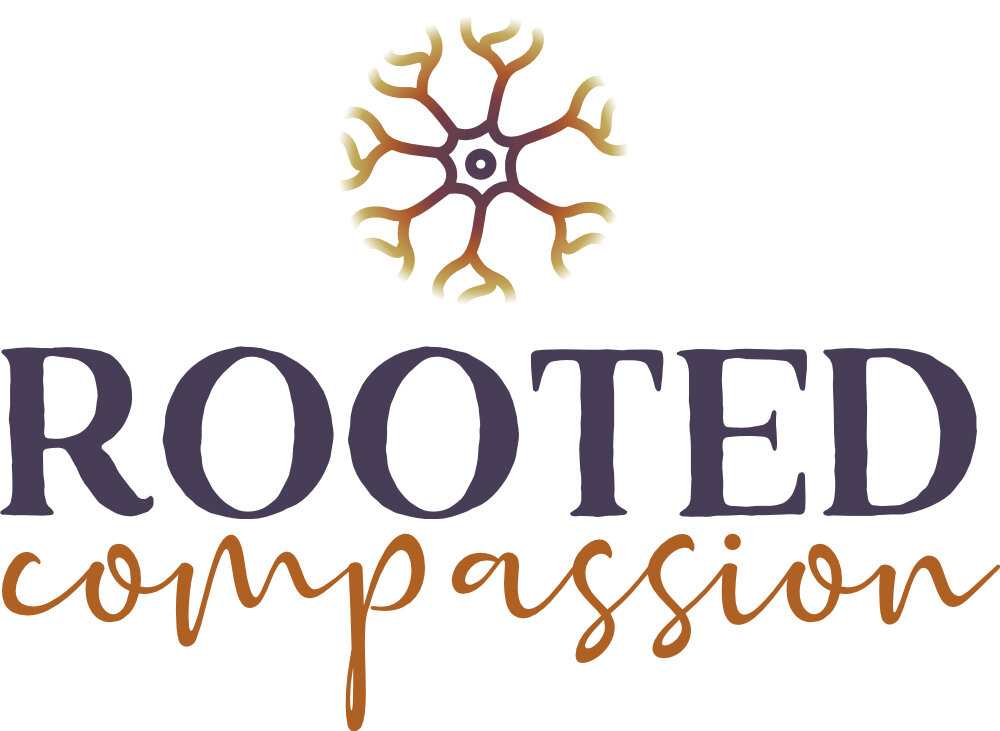
Blog

The Workplace and Our Mental Health
Given the increased need for mental health support in all areas of our lives, Rooted Compassion Counseling and Consulting has stepped forward to support businesses and employees in healing and growth. Each human deserves to have a meaningful and fulfilling purpose to live and fulfill. Businesses only benefit from partnering with employees to accomplish shared goals.

Cincinnati Therapist Explains the Hand Model of the Brain: Understanding your Emotional Responses
Cincinnati therapist, Amy Sullivan, MA, LPCC-S, Explains the Hand Model of the Brain: Understanding your Emotional Responses

Cincinnati Ohio Therapy Practice Offers More Than Talk Therapy
Cincinnati therapist, Amy Stenger-Sullivan, shares how Rooted Compassion Counseling is continuing to grow and support clients.

Simplifying the Polyvagal Theory, Part 2: Monitoring, Identifying and Regulating your Emotional States Will Lead to Better Mental Health
We move through these states all day every day to differing extents. I might wake and feel socially connected to my family by sharing breakfast or my dog throwing the ball for him. When I start work, I may fall into some level of flee or fight, maybe some anxiety when I see a long list of emails I need to tend to. And if one of those emails has bad news, I might sink into a shutdown. What if, following that, a team member comes into the office and we are able to talk and connect? That would likely ease the shutdown effect and help me move back into feeling connected and emotionally safe.

Simplifying the Polyvagal Theory, Part 1: How Being in Touch with Your Nervous System Changes Everything
Someone asked me to write one blog to simplify the Polyvagal Theory. It’s not that easy. This is the first in a series of blogs to explain the Polyvagal Theory, how it affects your nervous system and ultimately your mental health. I share this information through story and weave in the principles of the theory.

A Reflection on Being White and Exploring my Bias
What I bring with me tonight is confusion about my upbringing. When I was a little girl, we had a maid who was black. We all adored her. In many ways I spent more time with her than I did with my own mom. Clara taught me how to iron, chased me with a wet rag she would snap on the back of my thigh when I misbehaved, and lit up every time I walked into the room. She felt like a family member to me who came on Tuesdays and Thursdays. She rode the bus across town and had a long walk from the bus stop to our house. At Christmas time we would go to her house and see her husband and daughter. We would take them all Christmas presents. As a kid I thought they were happy to see us. As an adult I wonder how true that was. I wish I knew what her true experience of us was. Clara mothered me in ways that were very important to me. I worry and wonder if I treated her with the respect she deserved.

How to Use Principles of Polyvagal Counseling to Determine When Your Nervous System Feels Safe
As I have been talking to people about emotional felt safety, I’ve noticed a trend. Sometimes we move into a protective safety as opposed to a connected safety. Connected emotional felt safety is when you feel settled, calm, in good relationship with others if they are near you or not. Some people refer to it as supported, relaxed, or peaceful. This all indicates that our nervous system is relaxed and not receiving any cues of danger either physically or emotionally.

Train Your Nervous System to Know Peace Just as You Would Train For a Marathon
The best way to manage our emotional or nervous system reactivity is focus on what we do when we are not triggered.
In 2007 my mom passed away after a short battle with heart disease. I had so many mixed emotions about our relationship and her passing. My primary experience was a deep, deep grief. I found that walking outside was the only thing that helped alleviate that grief. Some days I walked for hours. And eventually the walking wasn’t enough, so I started running. Or maybe we would call it light jogging. I started in a pattern of jogging for a block, walking for a block, jogging for a block, walking for a block. One day I ran for one mile without stopping to walk, and it was on that day that I decided to run a half marathon with a team in training to raise money for the leukemia and lymphoma society in honor of both of my parents. I signed myself up and started their training program. In about five months I went from barely running a mile to running the full 13.2-mile half marathon.

Surprises Can Be Fun But Can Also Trigger Danger: How Does Your Nervous System Respond?
What has surprised you recently?
Maybe someone in your life shared some surprising news with you or a recent experience left you feeling unexpected emotions.
Maybe life threw you a curveball and you are left in a state of shock.
Maybe a stranger decided to pay for your coffee this morning and you walked away feeling delightfully surprised.
As we know, life is full of surprises (no surprise there, right?). We walk through our days not quite knowing what is waiting for us around the corner, but often thinking we do.

Polyvagal Theory, Session 6
As human beings, we are biologically inclined to assess for danger and to seek safety, both physically and emotionally. Dr. Stephen Porges’ research and study around the Polyvagal Theory and the vagus nerve supports that people are seeking that felt safety. One way we can do that is by paying attention to the tone of voice we use with others and with ourselves. Amy suggests that we take a look and notice our tone and then try to soften it when we are interacting with others and in our own minds. She offers two tips to soften your tone:
1. Sit down when you are having a difficult conversation.
2. Breathe. Allow your exhale to be longer than your inhale to bring your heart rate down before diving into a conversation.

Polyvagal Theory, Session 5
As social distancing mandates continued, Amy talks about her experience walking with a mask and sunglasses. She noticed that as she walked by people, they could not see her eyes or mouth, which prevented social connection. As she has discussed, Dr. Porges’ research shows that the vagus nerve directly connects with the facial nerves around the eyes allowing the eyes to show the true intention of the interaction. We use our eyes to signal and create felt safety for ourselves and for others. Amy’s advice, while treading these unknown waters of social distancing, is to continue to make eye contact with others, smile, and use a pleasant tone of voice to create felt safety between you and those around you.

Polyvagal Theory, Session 4
The Polyvagal Theory talks all about the vagus nerve. This nerve leaves the brain stem and goes to the torso and also branches up into the head where it affects hearing, speaking, and eye expressions. As we learn to apply the Polyvagal Theory and take notice to our nervous system reactions in our daily lives, Amy focuses on the vagus nerve and social connection. Amy provides two social connection tips:
1. Make time for face-to-face connection with someone every single day. Make sure you are looking the other person in the eye and try to eliminate any other distractions so you can be present and be thankful for the interaction.
2. PLAY! Don’t forget to make time for play. Do something that you love and that brings you joy.

Polyvagal Theory, Session 3
Mental health counselor and therapist, Amy Stenger-Sullivan speaks more on the Polyvagal Theory and how we can use the teachings within this theory to help us through uncertain times. Dr. Stephen Porges’ Polyvagal Theory dives into the science behind our human instinct of survival, both physically and emotionally. Amy discusses Dr. Porges’ four survival responses as flock, flee, fight, and freeze. As one of ten children, Amy had to discover ways to connect with her older siblings, which led her to discover her humor. She found that she could use humor to connect (and emotionally survive) with her older siblings and soon started using humor as her survival mechanism. When thinking about your own wellness, Amy challenges you to ask yourself, “What are my survival mechanisms? How do I use them? Is it helpful or hurtful to me?”

Polyvagal Theory, Session 2
Our connection and attachment to others is key to our survival, which proved difficult as the pandemic roared on. Dr. Stephen Porges, founder of the Polyvagal Theory, states that our main function as human beings is to survive (both physically and emotionally) and our survival is dependent on our connection to others. Amy Stenger-Sullivan has been studying the Polyvagal Theory for nearly ten years and now applies it in her therapy sessions when walking alongside her clients dealing with trauma, anxiety, depression, and grief. Amy first started her study of the Polyvagal Theory as an infant massage therapist. She talks through the effects of the pandemic on our physical, emotional, financial and mental health and how maintaining connection with those around us, in a safe way, will be crucial in our ability to thrive.

Polyvagal Theory, Session 1
As a Licensed Professional Clinical Counselor, Amy Stenger-Sullivan recognizes the dangers of the pandemic have brought on new and real feelings of vulnerability and insecurity for many of people. Through her in-depth study of the Polyvagal Theory, Amy talks about the function of the vagus nerve and how it directly relates to feelings of being unsafe leading to anxiety, depression, etc. She provides practical ways to stimulate your vagus nerve to lower your heart rate and your anxiety in hopes of reaching the feeling of felt safety.
